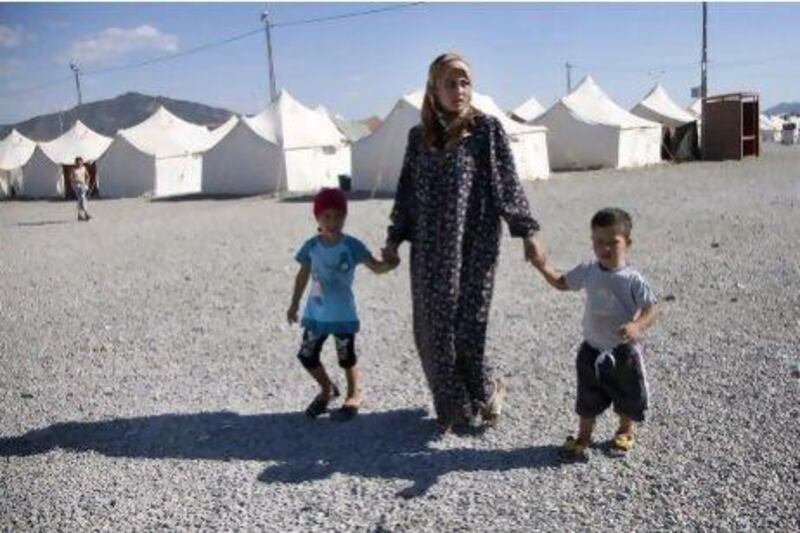ISTANBUL // The Turkish government has started moving Syrian refugees out of the border region in response to growing sectarian tensions there.
Up to 120,000 Syrians have fled to Turkey since anti-government protests began in March last year, a Turkish spokesman said yesterday.
He added that about 80,000 people were registered in refugee camps, and between 30,000 and 40,000 more Syrians had entered Turkey but lived outside the camps in rented houses or apartments in the border area.
"We kindly ask them to either go to the camps or continue their residence in a different city away from the border area," he said.
The spokesman said Turkey had been tolerating tens of thousands of Syrians outside the camps, even though many had entered the country without passports.
Others, who had entered Turkey legally with their passports and lived outside the camps, were in danger of exceeding their legal limit of a three-month stay, he said.
"We have to regularise this," he added.
The move to bring Syrians out of the border area followed a recent march in support of Syria's president, Bashar Al Assad, in the Turkish border province of Hatay.
Members of the local Alawite population there protested against the Ankara government's efforts to strengthen the mostly Sunni opposition against Mr Al Assad, who is an Alawite.
Most of the Syrian refugees in Turkey are also Sunni and are open in their criticism of Mr Al Assad. Hatay hosts five of the 11 Turkish refugee camps for Syrians.
Chanting slogans such as "Close the terror camps down", several hundred protesters in Hatay criticised the Turkish government's decision to take a stand against Mr Al Assad during the protest march on September 1.
Hatay was part of Syria until 1938 and the area has a large Alawite community.
Selim Matkap, the head of the Hatay Medical Board, used a speech during the September 1 march to accuse the government of raising tensions in Hatay.
"By supporting and taking sides for one of the parties in this war, the government of the Turkish republic automatically pushes other ethnic and religious groups to the fringes," Mr Matkap said, according to news reports.
A legislator from Hatay said yesterday that local residents wanted Syrian refugees to stay inside camps.
"If so many foreigners are on the streets, it raises tensions. We do not want them to leave the camps," Mehmet Ali Ediboglu, a member of the opposition Republican People's Party (CHP), who represents Hatay in parliament, said yesterday.
Mahmut Osman, Turkey's representative of the Syrian National Council (SNC), an opposition group, confirmed the Turkish authorities were moving refugees out of rented apartments and further away from the 900-kilometre border.
"There are some problems in Hatay," Mr Osman said. "Some people of the local population are saying they do not want the Syrians there any more."
Mr Ediboglu, the CHP legislator, said people in Hatay did not oppose shelters for the refugees, but were concerned about the growing number of "several thousand" Islamist fighters from Arab countries who used Hatay as a staging post to participate in the war in Syria.
Turkey, a former ally of Mr Al Assad, threw its weight behind the Syrian opposition last year after the Syrian president rejected calls by Ankara to launch political reforms and to stop a crackdown on a revolt that has killed at least 23,000 people.
The Al Assad government says Turkey is fanning the conflict.
Meanwhile, the death toll from a car bomb on Sunday night in Syria's largest city, Aleppo, has risen to 30.
Rebels have summarily executed at least 20 soldiers in the embattled northern city, according to the Syrian Observatory for Human Rights.
Captured at a military compound during a rebel attack in the eastern district of Hanano, the soldiers had their hands tied behind their backs before they were lined up and shot some time over the weekend, said the Observatory director, Rami Abdel Rahman.
Also yesterday, the Syrian army regained full control of a barracks in Aleppo after days of fierce clashes in which rebels were seeking to overrun the strategic site, a military official said.
"The Syrian army is in total control of the Hanano barracks after fighting which came to a complete halt during the night," the source said.
Five civilians were killed and dozens more hurt yesterday when regime forces shelled rebel areas of Damascus near Sayeda Zeinab, the Observatory said.
The organisation also said that violence flared in Deraa province, where a mother and her child were killed, and in the central province of Hama, giving an initial toll of 21 people killed nationwide yesterday.
* With additional reporting by the Associated Press and Agence France-Presse





